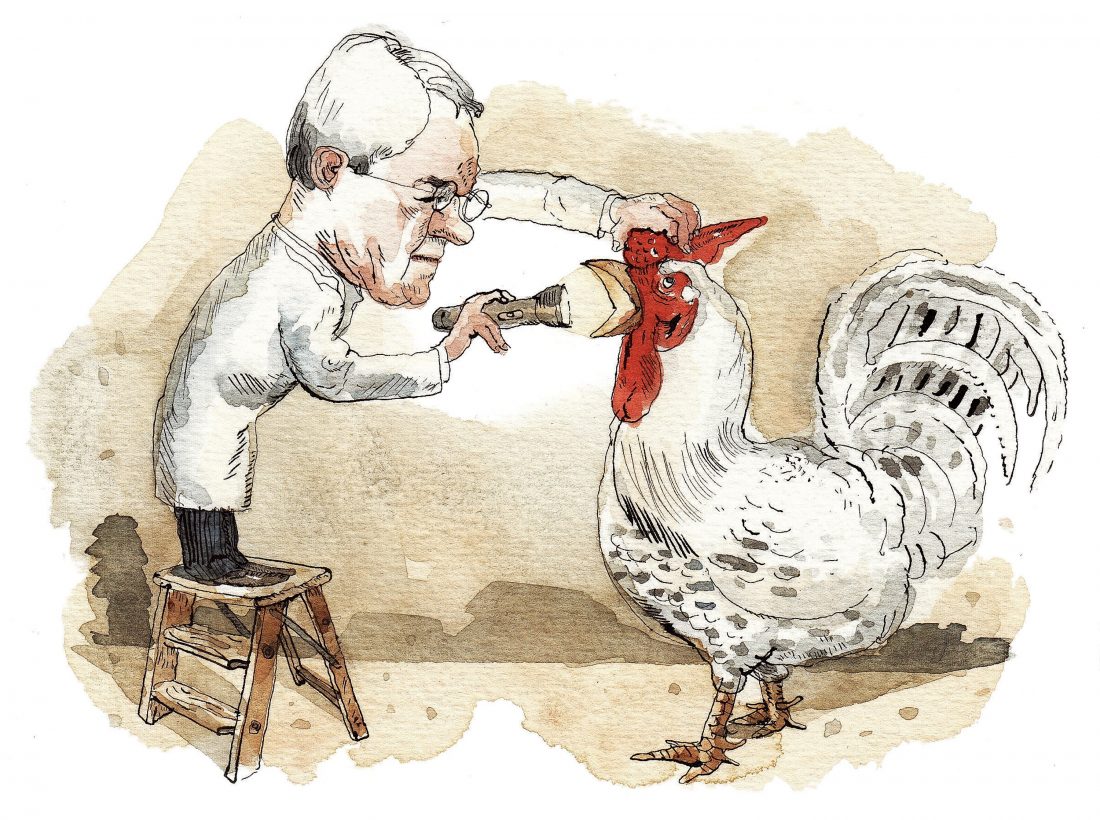“That thing grabbed my chicken by the tenders and held him underwater till he like to drowned.” I’ll bet you have never heard anybody say anything like that. Partly because nobody would ever volunteer that his fighting rooster was nearly killed by a duck. But mainly because “chicken tenders” are not parts of a chicken. And yet pretty nearly everywhere fried chicken is sold, one way it comes is in these boneless, gristle-less, anatomy-unrelated “tenders.” Like so many other things today, tenders are about 10 percent chicken and 90 percent marketing.
I was reflecting on this fact in a Popeyes in Greenville, Mississippi, recently, when my eyes strayed over to the buffet. Not every fried-chicken outlet has a buffet, but this did, perhaps because it was Southern, and on that buffet was a big pan of something that is very much an actual working part of the actual birds known as chickens:
Chicken gizzards.
And I bought me some. And I chewed. And chewed.
The gizzard is what a chicken has instead of teeth. When you are chewing a gizzard, you are having the rare experience of chewing what chews. Where else in the food chain are you going to get an experience like that? If eating pig’s feet puts a spring in your step, you might in effect be trotting on the trotters; but that’s a big if.
Here’s how chicken digestion operates. When a chicken pecks up a bug, say, it swallows it down to the crop, also known as the craw, as in “This whole concept of chicken tenders just sticks—figuratively speaking—in my craw.” The crop holds the bug and marinates it in digestive juices until the gizzard croaks (or maybe not croaks, but some kind of gravelly tone), “Okay, gimme what you got.” And the gizzard’s wrenchy slaunchwise muscles and its “horny callosities” (to quote one technical description), and the bits of grit and gravel that the chicken swallows in order to assist the gizzard, go to work on that bug until it turns into…
What would you say it turns into? I would say it turns into proto-chicken. Let’s set aside that old conundrum of which came first, chicken or egg. The chicken gizzard is where chicken begins.
Here, from The Breeder’s Handbook: A Field Guide to the Natural History of North American Birds, is a tribute to the gizzard: “…objects that required more than four hundred pounds of pressure per square inch to crush have been flattened within twenty-four hours when experimentally fed to a turkey.”
Aside from Molly Bloom saying Yes and Yes and Yes so expansively at the end, what does any reader of Ulysses, by James Joyce, remember? “Mr. Leopold Bloom ate with relish the inner organs of beasts and fowls. He liked thick giblet soup, nutty gizzards…” and so on. Joyce himself obviously relished that passage, because further along in the book he’s still tasting it: “As said before he ate with relish the inner organs, nutty gizzards…” and so on. What a comedown it would be if Ulysses were written today, and Mr. Bloom ate without effort odd notional figments of fowl.
There’s an Uncle Remus story, “Brother Rabbit and the Gizzard-eater,” which ends (spoiler alert) in B’rer Rabbit cackling:
“You po’ ol’ Gator, ef you know’d A fum Izzard,
You’d know mighty well dat I’d keep my Gizzard.”
But gizzards are not always cherished things, in literature. For a serious person to concern himself with conventional politics, wrote Henry David Thoreau in his essay “Life Without Principle,” would be “as if a thinker submitted himself to be rasped by the great gizzard of creation. Politics is, as it were, the gizzard of society, full of grit and gravel, and the two political parties are its two opposite halves…which grind on each other.”
I hear that, all right. And maybe a chicken would rather have some slicker method of digestion. Peel the outer layer off an uncleaned gizzard and you are likely to find all manner of inorganic detritus. Human heartburn must be a piece of cake compared with chicken gizzardburn.
But that’s the chicken’s problem. The toughness that the bird requires in this vital organ translates into this indubitable virtue for whoever undertakes to eat one: The longer you have to chew on something, the longer you get to taste it.








